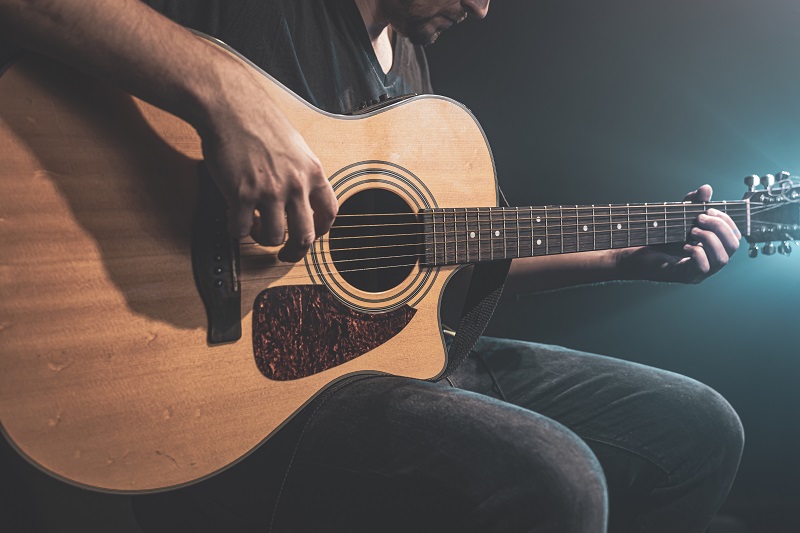home | showtimes | coming soon | music | special events
about us | directions | press | donors

Guitars And Pop Culture
Are you ready to dive into the fascinating world of guitars and pop culture?
Prepare to be captivated by the evolution, influence, and artistic power of this iconic instrument.
From the electrifying sound of rock and roll to the soulful melodies of folk and acoustic music, guitars have played a pivotal role in shaping our musical landscape.
Join us as we explore how these six-string wonders have left an indelible mark on our collective imagination.
Get ready for a journey through time, sound, and creativity.
Key Takeaways
- • The electric guitar's evolution and influence have played a significant role in shaping pop culture.
- • Famous musicians like Hendrix, Clapton, and Page have popularized the electric guitar and made it an iconic symbol in pop culture.
- • Guitars have added depth, emotion, and a distinctive element to popular music, creating powerful riffs and catchy hooks.
- • The electric guitar's contribution to the ever-changing landscape of music has made it an integral part of contemporary popular culture.
The Evolution of the Electric Guitar
You'll be amazed by how the electric guitar has evolved over the years. Technological advancements in electric guitars have played a significant role in shaping its journey.
From its humble beginnings as a hollow-body instrument with limited sound projection, to the solid-body design that revolutionized the music industry, the electric guitar has come a long way.
The introduction of pickups and amplifiers allowed for greater volume and tonal possibilities, making it perfect for rock and roll. Famous musicians like Jimi Hendrix, Eric Clapton, and Jimmy Page further popularized the electric guitar through their virtuosic playing styles and iconic performances.
Their influence led to an explosion of guitar-driven music genres like blues, rock, and metal, forever cementing the electric guitar's place in pop culture.
The Influence of Guitars in Rock and Roll
Rock and roll has been greatly shaped by the influence of guitars. From the raw energy of modern punk to the iconic guitar solos in classic rock, guitars have played a pivotal role in shaping the sound and feel of this genre. The electric guitar, in particular, has allowed musicians to push boundaries and create new sounds that define rock and roll.
Here are three key ways guitars have influenced rock and roll:
Guitars in modern punk: In genres like punk, the guitar is often used to create fast-paced, aggressive riffs that drive the music forward. Bands like The Ramones and Sex Pistols relied heavily on distorted power chords to capture the rebellious spirit of punk.
The iconic guitar solos in classic rock: Classic rock wouldn't be complete without those unforgettable guitar solos. Legends like Jimi Hendrix, Eric Clapton, and Jimmy Page showcased their virtuosity through intricate solos that became instantly recognizable and often defined their songs.
The influence of guitars in rock and roll cannot be overstated. They have become a symbol of rebellion, emotion, and musicality, making them an integral part of this genre's history.
Guitars in Folk and Acoustic Music
Explore the rich tapestry of folk and acoustic music, where the soulful strumming and heartfelt melodies transport you to a world steeped in tradition and storytelling.
Guitars play a vital role in this genre, adding depth and emotion to every note. In country music, guitars are often the backbone of the sound, providing a rhythmic foundation for twangy vocals and lyrics that capture life's ups and downs. From Hank Williams to Dolly Parton, guitars have helped shape the iconic sound of country music.
In blues music, guitars take on a different persona. They wail with raw intensity, echoing the pain and longing of those who have experienced hardship. Legends like Robert Johnson and B.B. King used their guitars as extensions of their souls, channeling their emotions through every powerful chord.
Resonator or Dobro guitars are perfect for a slightly electric guitar-like vibe and a mellower tone, great for country and blues.
Whether it's the sweet melodies of country or the raw power of blues, guitars have found their place in folk and acoustic music, leaving an indelible mark on these timeless genres.
The Guitar's Role in Shaping Music and Art
The guitar has played a pivotal role in shaping the evolution of music and art. Its versatility and unique sound have made it an essential instrument in various genres, including jazz and blues.
In jazz, the guitar is often used to provide rhythmic support or as a solo instrument, adding depth and texture to the music. Blues, on the other hand, heavily relies on the expressive capabilities of the guitar to convey emotions and tell stories.
In contemporary popular music, guitars continue to have a significant impact. They are often used as a main instrument in rock bands, creating powerful riffs and memorable melodies. Additionally, they add a distinctive element to pop songs, providing catchy hooks or acoustic accompaniments.
The guitar's timeless appeal ensures its ongoing influence on the ever-changing landscape of music and art.
Conclusion
In conclusion, guitars have played a crucial role in shaping popular culture.
From the evolution of the electric guitar to its influence in rock and roll, folk, and acoustic music, this versatile instrument has left its mark on various genres.
It has not only shaped the sound of music but also influenced art and fashion.
For instance, imagine a world without Jimi Hendrix's iconic guitar solos or Kurt Cobain's raw energy on stage.
The guitar's impact is undeniable and continues to captivate audiences worldwide.
